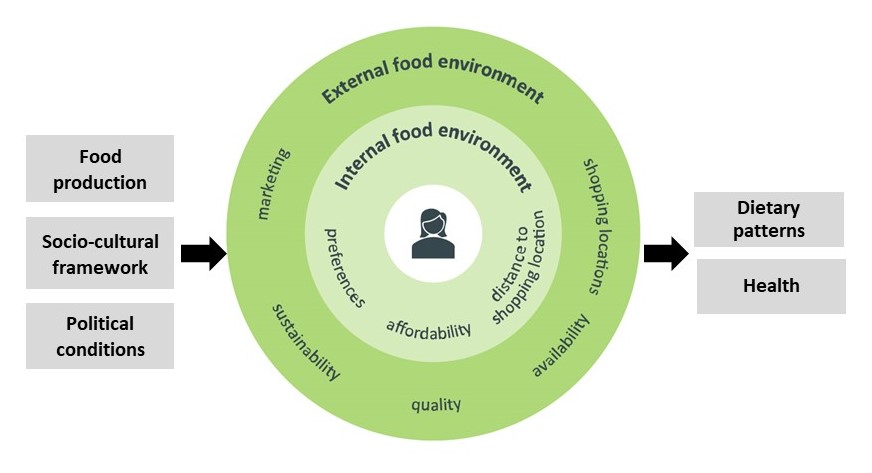Project
Shaping Food Environments in Transitioning Economies

Shaping food environments in transitioning economies for sustainable and healthy diets
Worldwide, malnutrition contributes to the rise in non-communicable diseases. This particularly affects transition economies in the global South where dietary habits are undergoing major changes. In this joint project, we are investigating food environments in sub-Saharan Africa and Southeast Asia and developing solutions to make them healthier and more sustainable.
Background and Objective
Malnutrition (undernutrition, micronutrient deficiencies and overnutrition) is widespread in many countries today regardless of the level of wealth. Dietary habits as well as increasingly uniform and unhealthy value chains worldwide contribute significantly to the spread of non-communicable diseases. The transition to a diet with increased consumption of meat, sugar and high-calorie, high-fat and refined starch-based foods is increasing sharply in low- and middle-income countries, and so are non-communicable diseases.
Our multidisciplinary project aims to create a shared understanding of the problems and opportunities in this area. We intend to develop solutions for shaping a food environment in emerging economies that promote the consumption of nutritious food leading to better health results. The focus is on Southeast Asia (Malaysia) and Sub-Saharan Africa (Ghana, South Africa, Tanzania).
For this purpose, the food environments of the urban poor in the four partner countries will be studied since one of the major drawbacks of rapid urbanisation is the increase in poverty and inequality in cities.
Our research consortium consists of
- Council for Scientific and Industrial Research in Ghana
- University of Nottingham Malaysia
- University of KwaZulu-Natal in South Africa
- Sokoine University of Agriculture in Tanzania
Approach
The project will utilise a variety of methodological approaches to assess the personal and external food environments as well as the policy framework. Together with local stakeholders, approaches for evidence-based policy recommendations will be developed. The project will result in the design of a reference model that will show how the approaches and results can be applied on a broader scale in the global South.
The main objective of the FETE project consortium is to answer the following questions:
- Who are the key stakeholders and players needed in each partner country to shape the food environment for healthy and sustainable diets?
- What are the key drivers for dietary habits and trends that affect the health of the urban poor in each partner country?
- What are the key and common challenges and opportunities of the food environment in all partner countries?
- What are suitable dietary and policy recommendations (and the key players and pathways of implementation) to improve the nutritional situation of the most vulnerable urban poor communities?
- How can the developed methods and the obtained results be disseminated more widely in the Global South?
Links and Downloads
External project website: https://www.fete-project.de/
Thünen-Contact

Involved Thünen-Partners
Involved external Thünen-Partners
-
University of KwaZulu-Natal (UKZN)
(Durban, Südafrika) -
Sokoine University of Tanzania
(Morogoro, Vereinigte Republik Tansania) -
Council for Scientific and Industrial Research
(Accra, Ghana) -
The University of Nottingham in Malaysia (UNM), School of Biosciences
( Jalan Broga, 43500 Semenyih Selangor Darul Ehsan, Malaysia)
Funding Body
-
Federal Office for Agriculture and Food (BLE)
(national, öffentlich)
Duration
1.2023 - 9.2026
Publications
- 0
Goh EV, Sobratee-Fajurally N, Allegretti A, Sardeshpande M, Mustafa M, Azam-Ali SH, Omari R, Schott J, Chimonyo VGP, Weible D, Mutalemwa G, Mabhaudhi T, Massawe F (2024) Transforming food environments: a global lens on challenges and opportunities for achieving healthy and sustainable diets for all. Front Sustain Food Syst 8:1366878, DOI:10.3389/fsufs.2024.1366878

![[Translate to English:] [Translate to English:]](/media/_processed_/3/e/csm_AdobeStock_249730128_92f14d3a63.jpeg)
![[Translate to English:] [Translate to English:]](/media/_processed_/3/e/csm_AdobeStock_249730128_a6fcf4c893.jpeg)






